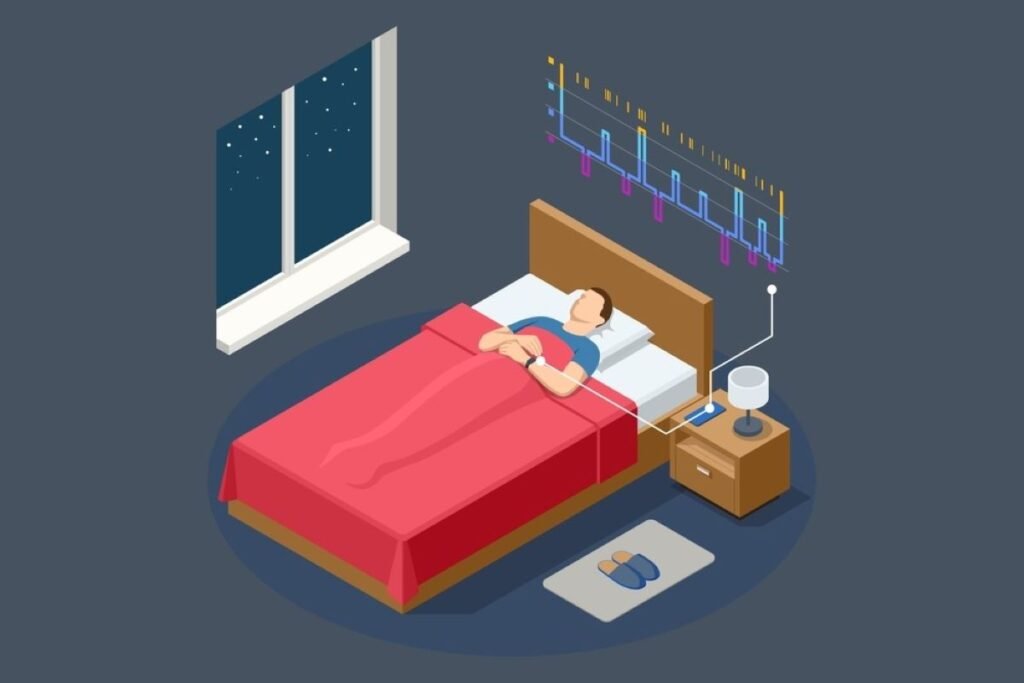Overview of the Relationship Between Sleep Quality and Liver Health
The relationship between sleep quality and liver health is complex and interconnected. The circadian rhythm is like a built-in clock in our bodies that controls many things, including when we feel sleepy or awake. There is also significant Impact of sleep on liver function. When we sleep, our liver does important jobs like getting rid of harmful substances and breaking down what we eat (like fats and carbs). Sleep helps the liver do these tasks properly. Having a regular and good amount of sleep is crucial because it helps the liver stay healthy. If our sleep is all over the place or we don’t sleep enough, it can mess with how well the liver works. This could lead to health problems.
Liver Function and its Role in Metabolism and Detoxification
The liver plays a vital role in metabolism and detoxification processes in the body. It is responsible for processing nutrients from the food we eat, converting them into usable forms, storing essential vitamins and minerals, and regulating blood sugar levels. In terms of metabolism, the liver helps break down carbohydrates, proteins, and fats into energy that the body can use. It also produces bile, which is essential for digesting fat. The liver plays a key role in storing and releasing glucose as needed to maintain stable blood sugar levels. When it comes to detoxification, the liver filters and removes toxins and waste products from the blood. It converts harmful substances into less toxic forms that can be excreted from the body. The liver also plays a role in metabolizing drugs and alcohol, breaking them down so they can be eliminated.
Effects of Poor Sleep Quality on Liver Function
Negative effects of sleep on liver function can be caused by inadequate sleep. When we do not get enough sleep or experience disrupted sleep patterns, it can lead to a condition known as sleep deprivation. Here are some key aspects to consider:
Disruption of Circadian Rhythms
The liver plays a crucial role in regulating metabolism, detoxification, and energy storage, all of which are tightly controlled by the body’s internal clock. When sleep patterns are irregular or insufficient, it can disrupt the liver’s ability to perform these functions effectively. Inadequate sleep has been linked to an increased risk of fatty liver disease, insulin resistance, and other metabolic disorders that can put a strain on the liver. Circadian rhythms help regulate the timing of liver functions, such as glucose production, cholesterol synthesis, and detoxification processes. Disruption of these rhythms can lead to imbalances in these processes, potentially contributing to liver dysfunction.
Increased Risk of Non-Alcoholic Fatty Liver Disease (NAFLD) and Hepatic Steatosis
Individual with poor quality sleep, there is a detrimental impact of sleep on liver function, leading to an increased risk of conditions such as Non-Alcoholic Fatty Liver Disease (NAFLD) and Hepatic Steatosis. Research has shown that individuals who experience inadequate or disrupted sleep are more likely to develop NAFLD, a condition characterized by the accumulation of fat in the liver. Lack of quality sleep can disrupt the body’s metabolic processes, leading to imbalances in hormones that regulate appetite and energy expenditure. This can result in increased fat storage in the liver, contributing to the development of hepatic steatosis. Additionally, poor sleep patterns can lead to inflammation and oxidative stress, further exacerbating liver damage.
Impaired Glucose Metabolism and Insulin Sensitivity in Relation to Liver Health
When an individual consistently experiences inadequate or poor-quality sleep, it can disrupt the body’s normal metabolic processes, leading to dysregulation of glucose metabolism and insulin sensitivity. Research has shown that chronic sleep deprivation or poor sleep quality can contribute to insulin resistance, which is a condition where the body’s cells become less responsive to insulin, a hormone that helps regulate blood sugar levels. Insulin resistance can lead to elevated blood sugar levels, increasing the risk of developing type 2 diabetes and other metabolic disorders.
Mechanisms Behind Sleep-Liver Interaction
Understanding the intricate relationship between sleep quality and liver function involves delving into several key mechanisms that govern this interaction:
Liver Metabolism and Detoxification Processes During Sleep
The liver’s metabolic and detoxification functions are closely tied to the body’s circadian rhythms. During sleep, especially deep or slow-wave sleep, the liver prioritizes essential metabolic processes, including the breakdown of toxins, bile production, and the regulation of cholesterol and glucose levels. During sleep, especially during overnight fasting, the liver is involved in storing glucose in the form of glycogen. This stored glycogen is gradually released during sleep to maintain stable blood sugar levels, ensuring a steady energy supply for the body.
Hormonal Balance and Inflammatory Response in the Liver
One of the key hormones involved in the sleep-liver interaction is cortisol, often referred to as the stress hormone. Cortisol levels follow a rhythmic pattern throughout the day, known as the circadian rhythm, with peak levels in the morning and lower levels at night. Disruption of this rhythm, such as in individuals with sleep disorders or shift workers, can lead to dysregulation of cortisol and affect liver function. Additionally, sleep deprivation or poor quality sleep can lead to imbalances in other hormones, such as insulin and ghrelin, which can impact liver health. Insufficient sleep has been associated with insulin resistance, a risk factor for liver diseases like fatty liver disease and non-alcoholic steatohepatitis (NASH).
Rapid Eye Movement (REM) Sleep for Liver Regeneration and Repair
During REM sleep, the body undergoes various processes that contribute to the regeneration and repair of different organs, including the liver. Studies have shown that REM sleep plays a crucial role in the maintenance and repair of liver tissue. This stage of sleep is characterized by increased brain activity, muscle relaxation, and vivid dreaming. It is during REM sleep that the body enters a state of deep restorative rest, allowing for the renewal of cells and tissues throughout the body, including the liver. Specifically, REM sleep has been found to stimulate the production of growth hormone, which is essential for the repair and regeneration of liver cells. Additionally, REM sleep is associated with increased protein synthesis, which is crucial for the maintenance of liver function and overall health.
Tips to Improve Sleep Quality for Liver Health
Improving sleep quality can significantly benefit liver health. quality sleep is essential for overall health, including liver function. By incorporating these following tips into your routine, you can support your liver health and overall well-being. Here are some tips to improve sleep quality for liver health:
Establishing a Consistent Bedtime Routine
Sleep is very important for our health. Adults should sleep for 7-9 hours every night. It helps us feel good, stay healthy, and remember things. If we don’t get enough good sleep, it can affect our life, mood, and relationships. Try to go to bed and wake up at the same time every day, even on weekends. This helps regulate your body’s internal clock and promotes better sleep quality and liver health.
Creating a Sleep-friendly Environment
- Make sure your bedroom is conducive to good sleep by keeping it dark, quiet, and cool. Consider using earplugs, an eye mask, or a white noise machine if needed.
- Develop a relaxing bedtime routine to signal to your body that it’s time to wind down. This could include reading a book, taking a warm bath, or practicing relaxation techniques like deep breathing or meditation. This is a key tip for creating a sleep-friendly environment, recommended by liver treatment doctors for their patients.
Limiting Stimulants and Electronic Device Use Before Bed
- The blue light emitted by electronic devices like smartphones and laptops can interfere with your body’s production of melatonin, a hormone that regulates sleep. Try to avoid screens at least an hour before bed.
- Avoid consuming stimulants such as caffeine and nicotine close to bedtime, as they can interfere with your sleep cycle and affect liver function. Opt for herbal teas or warm milk instead.
Meditation and Deep Breathing Exercises
Meditation can help reduce stress and promote relaxation, which are beneficial for overall liver function. Deep breathing exercises can help calm the mind and body, leading to better sleep quality and liver health. Engaging in regular physical activity can help improve the quality of your sleep. Just make sure to complete your workout at least a few hours before bedtime to avoid interfering with your ability to fall asleep.
it is clear that there is a major impact of sleep on liver function as a good sleep quality plays a crucial role in maintaining optimal liver function. Ensuring a good night’s sleep can significantly impact the health of your liver and overall well-being. If you are experiencing any liver-related issues, such as fatty liver disease or hepatitis, seeking timely treatment is essential. As “Liver Treatment in India”, we are dedicated to providing comprehensive information on liver health and connecting you with the best liver expert doctor and best liver transplant hospital in india. Remember, a healthy liver is key to a healthy life. Prioritize your sleep and liver health today for a brighter tomorrow.

